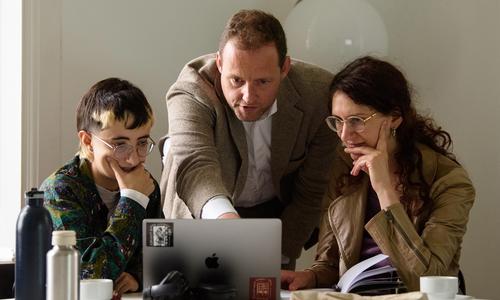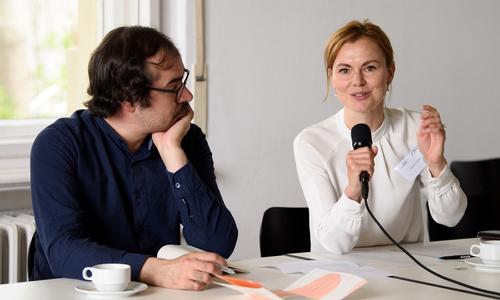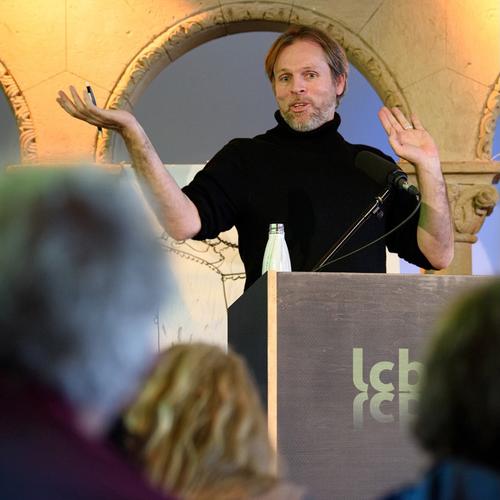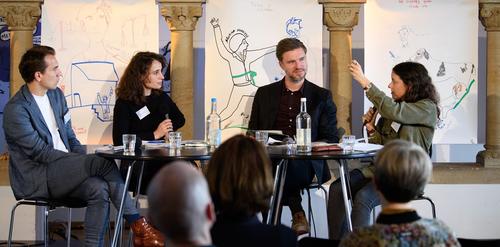Section II: Academic Practices

Digital Humanities Workshop | 4 July
Image Credit: Tobias Bohm 2024 for EXC 2020
Digital Humanities Workshop | 5 July
Image Credit: Tobias Bohm 2024 for EXC 2020
The first focal point in this section was in the area of digital debates. Two Digital Humanities Workshops took place:
Measuring Public Engagement and the Valuation of Literature on Wikipedia | Thursday, 4 July 2024
with Viktor J. Illmer, Frank Fischer and Bart Soethaert
The first workshop on Thursday afternoon dealt with the evaluation of literature in Wikipedia articles. It explored how the qualitative assessment of literature can be measured from a quantitative perspective. During this interactive workshop, participants critically examined metrics that provide information about public engagement with literature on Wikipedia and explored valuation practices while learning how to access the relevant metadata provided on Wikipedia. This hands-on exploration aimed to generate valuable insights and encourage critical reflection on public engagement and the valuation of specific authors and literary works within the world’s largest multilingual encyclopaedia project.
The Visible Editor: Valuing Literature through Editorial Practices in Open and Digital Publishing | Friday, 5 July 2024
Robert Forke, Rebecca Hardie, Eva Locher, Christopher Ohge and Emma Gallon
The second workshop on Friday afternoon was hosted by Rebecca Hardie. Experts from German and English publishing houses discussed the role of evaluation in editorial practices in open and digital publishing.
The second focus was on a central method of literary studies, namely on close reading.
Keynote by Joseph North: Does Close Reading Have a Politics? | Thursday, 4 July 2024
Chair: Eva Geulen
Particularly in the context of its origins in English and American New Criticism, close reading is often treated as a procedure that approaches its object, the literary text, neutrally and objectively. However, even the central founding figure of close reading, I.A. Richards, clearly acknowledged evaluation as an important aspect of the professional approach to literature: "There is, it is true, a valuation side to criticism. When we have solved, completely, the communication problem, when we have got, perfectly, the experience, the mental condition relevant to the poem, we have still to judge it, still to decide upon its worth." (Richards, Practical Criticism, p. 11.)
Close reading thus necessarily involves value decisions or leads to them, as Richards points out. Additionally, the decision to carry out a close reading in the first place is also shaped by methodological presuppositions that are themselves implicated in value judgments within literary theory. And finally, close reading is always related to ideologies and political attitudes that bring about its application or its rejection.
In recent years, Joseph North at Yale University has drawn attention to this last point in particular, and we were very pleased to welcome him as keynote speaker on Thursday afternoon. His talk was chaired by Eva Geulen, who has also been working for years on the topicality of close reading for the present and future of literary studies.
Panel Discussion: The Circulation of "Close Reading" – World Wide?
Image Credit: Tobias Bohm 2024 for EXC 2020
Panel Discussion: The Circulation of "Close Reading" – World Wide? | Thursday, 4 July 2024
With Yvonne Albers, Dustin Breitenwischer and Jasmin Wrobel. Chair: Florian Fuchs
Following the keynote, we had a discussion with two former and one current postdoc of the Cluster on how close reading practices are evaluated beyond the North Atlantic core area of Close Reading in the narrower sense. Yvonne Albers, Dustin Breitenwischer and Jasmin Wrobel gave short opening statements followed by a discussion on the relevance of close reading in Latin America, Arabic-speaking countries and in African-American Studies. The discussion focused on alternative concepts and traditions of close reading as well as on the trajectories of its reception and its extension to other media.



